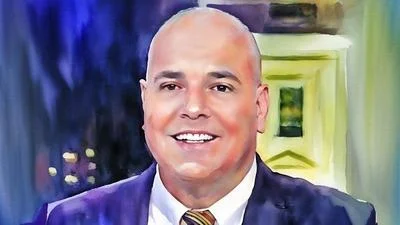In a wide-ranging interview, U.S. Rep. Don Bacon (R-NE)—retired U.S. Air Force brigadier general and former NATO Commander—draws on decades of military and intelligence experience to make a case for stronger U.S. support for Ukraine.
As chair of the House Armed Services Cyber Subcommittee, he has strong views about Russian aggression, the strategic stakes of drone warfare, and the moral imperative of backing Ukraine’s fight for sovereignty and freedom.
“I naturally come out of wanting to support Ukraine…they want to go towards the West for free markets, democracy and rule of law,” Bacon says. His support for Ukraine isn’t new; it dates back to his youth. “I was one of these weird kids that liked history...I was studying Russia as a teenager. I’ve always respected the threat the Soviet Union posed, and later, Russia.”
Bacon believes the 1994 Budapest Memorandum, in which Russia committed to respecting Ukraine’s sovereignty in exchange for Ukraine surrendering its nuclear weapons, is a moral and strategic touchstone. “It shows that Russia committed to respecting the sovereignty of Ukraine,” he explains. But to him, the real driver is a lifetime of understanding Russian aggression and Ukrainian desire for freedom. “I think I just inherently know that Ukraine is on the right side of this issue, and Russia’s on the bad side.”
He views the recent rare earth minerals deal between Ukraine and the United States with cautious optimism. While initially critical of the transactional framing, Bacon sees value in the outcome. “If that brings in U.S. investment into Ukraine, it helps create jobs, helps create more prosperity. Also signaling to the Russians, when you bomb Ukraine, you're bombing an economic partner of the United States.”
Bacon’s view is that a shift by President Trump to recognize Russia’s intentions is a good sign. “He should have always known Russia’s on the evil side...but I hear a difference in how he’s communicating since we got this agreement–I hope it lasts.”
Having visited Ukraine’s frontlines and stood on the outskirts of Kyiv where Russian troops were stopped, Bacon speaks about the stakes. “Ukraine never wanted this war; they were invaded,” he says. “They want our way of life, and Russia says no...They don’t want a neighbor to have these kinds of freedoms because then the Russians will want them someday.”
He adds that history is etched into every Ukrainian family. “When I go to the Baltics...every family member there has had somebody shot or sent to Siberia. The Ukrainians are the same way.”
Bacon is impressed by Ukraine’s battlefield innovation, particularly in drone warfare. He points to the recent success of drones outfitted with American AIM-9 missiles shooting down Russian SU-30 fighter jets as groundbreaking. “It’s a first, and it shows how innovative the Ukrainians are–they're innovative, they're tough, and they're fighting for their lives.”
As chair of the Cyber Subcommittee, Bacon monitors the evolving technological dimension of warfare. “There’s a tremendous electronic warfare fight going on here,” he explains. “Frankly, they're more advanced right now than what America can do. Every day they have to innovate in this drone war. America can learn a lot from Ukraine.”
Bacon believes Ukraine’s successes, especially in naval operations without a traditional navy, speak volumes. “Ukraine has Black Sea sea supremacy, and they don’t even have a single Navy ship. That’s pretty hard to do,” he says, pointing to Ukrainian sea drones that have sunk Russian ships far off the coast.
Bacon is skeptical of ceasefires proposed by Russia. “The Russians announced a ceasefire during Easter and violated it within ten minutes,” he recalls. “If I was Zelensky, I would probably launch 100, 200 drones and make Moscow feel a little heat. This is war. Russia invaded Ukraine. They murdered and massacred people.”
He also questions the sincerity of Russian negotiations. “We're too quick to want to make a deal,” he warns. “Russia wants to control Ukraine’s foreign policy. None of this is acceptable.”
Despite the devastation and complex diplomacy, Bacon expresses admiration for Ukraine’s resilience. “I think they have the advantage right now on the battlefield. And it's these drones that are making a difference,” he says. “We should be partnering with them in all of this drone technology. It’s to our benefit to learn.”
“Before the invasion of 2022, I was a reluctant person for NATO expansion,” Bacon says. “But once Russia invaded and done what they've done...I believe Ukraine has earned the right to be considered for NATO, or at least to have a military alliance with America, Great Britain, or France.”
For Bacon, the battle is about defending democratic ideals. “Russia has lost all right to complain,” he says. “They squandered their right to have a voice with us.”









